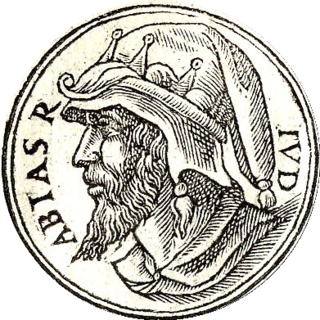Related Research Articles
Abijah is a Biblical Hebrew unisex name which means "my Father is Yah". The Hebrew form Aviyahu also occurs in the Bible.

Abimelech was the generic name given to all Philistine kings in the Hebrew Bible from the time of Abraham through King David. In the Book of Judges, Abimelech, son of Gideon, of the Tribe of Manasseh, is proclaimed king of Shechem after the death of his father.

Abijam was, according to the Hebrew Bible, the fourth king of the House of David and the second of the Kingdom of Judah. He was the son of Rehoboam and the grandson of Solomon. The Books of Chronicles refer to him as Abijah.
Ahijah is a name of several biblical individuals:
- Ahijah the Shilonite, the Biblical prophet who divided the Kingdoms of Israel and Judah.
- One of the sons of Bela. In AV (KJV) called "Ahiah."
- One of the five sons of Jerahmeel, who was great-grandson of Judah.
- A Pelonite, one of David's heroes ; called also Eliam.
- A Levite having charge of the sacred treasury in the temple.
- One of Solomon's secretaries.
- Son of Ahitub, Ichabod's brother; the same probably as Ahimelech, who was High Priest at Nob in the reign of Saul and at Shiloh, where the Tabernacle was set up. Some, however, suppose that Ahimelech was the brother of Ahijah, and that they both officiated as high priests, Ahijah at Gibeah or Kirjath-jearim, and Ahimelech at Nob.
- Father of King Baasha of Israel

Ahimelech, the son of Ahitub and father of Abiathar, but described as the son of Abiathar in 2 Samuel 8:17 and in four places in 1 Chronicles. He descended from Aaron's son Ithamar and the High Priest of Israel Eli. In 1 Chronicles 18:16 his name is Abimelech according to the Masoretic Text, and is probably the same as Ahiah.
Ammihud is the name of several Hebrew Bible figures:
Seraiah or Sraya is the name of several people mentioned in the Hebrew Bible, and a name with other non-biblical uses.

Moriah is the name given to a mountainous region in the Book of Genesis, where the binding of Isaac by Abraham is said to have taken place. Jews identify the region mentioned in Genesis and the specific mountain in which the near-sacrifice is said to have occurred with "Mount Moriah", mentioned in the Book of Chronicles as the place where Solomon's Temple is said to have been built, and both these locations are also identified with the current Temple Mount in Jerusalem. The Samaritan Torah, on the other hand, transliterates the place mentioned for the binding of Isaac as Moreh, a name for the region near modern-day Nablus. It is believed by the Samaritans that the near-sacrifice actually took place on Mount Gerizim, near Nablus in the West Bank.

Korah, son of Izhar, is an individual who appears in the Book of Numbers of the Hebrew Bible and four different verses in the Quran, known for leading a rebellion against Moses. Some older English translations, as well as the Douay–Rheims Bible, spell the name Core, and many Eastern European translations have Korak.

Elizabeth was the mother of John the Baptist, the wife of Zechariah, and maternal aunt of Mary, mother of Jesus, according to the Gospel of Luke and in Islamic tradition. She was past normal child-bearing age when she conceived and gave birth to John.

The Oath More Judaico or Jewish Oath was a special form of oath, rooted in antisemitism and accompanied by certain ceremonies and often intentionally humiliating, painful or dangerous, that Jews were required to take in European courts of law until the 20th century. More Judaico is Latin for "according to Jewish custom."
Raamah is a name found in the Torah, meaning "lofty" or "exalted", and possibly "thunder".

Dathan was an Israelite mentioned in the Old Testament as a participant of the Exodus.

Korach or Korah is the 38th weekly Torah portion in the annual Jewish cycle of Torah reading and the fifth in the Book of Numbers. It tells of Korach's failed attempt to overthrow Moses.
The male given name Zechariah is derived from the Hebrew זְכַרְיָה, meaning "The Lord has remembered." It has been translated into English in many variant forms and spellings, including Zachariah, Zacharias and Zachary.
Eliab, also spelled Eliaab, is a male name, held by three different people in the Hebrew Bible, respectively the sons of Helon, Pallu, and Jesse. Only the last is covered in any detail.
Ahitub was a High Priest of Israel cited in the Bible.
References
- ↑ "Strong's Hebrew 48_ אֲבִירָם (Abiram) -- exalted father, an Israelite name" . Retrieved 2015-08-02.
- ↑ Numbers 16:1–40
- ↑ 26:9–11
- ↑ Psalms 106:17
- ↑ Herbermann, Charles, ed. (1913). . Catholic Encyclopedia . New York: Robert Appleton Company.
- ↑ "Strong's Hebrew 2419: Chiel".
- ↑ 1 Kings 16:34
- ↑ Joshua 6:26
- ↑ "Abraham". Jewish Encyclopedia Volume I. Funk & Wagnalls/Hathi Trust. 1925 [1902].
![]() This article incorporates text from a publication now in the public domain : Easton, Matthew George (1897). "Abiram". Easton's Bible Dictionary (New and revised ed.). T. Nelson and Sons.
This article incorporates text from a publication now in the public domain : Easton, Matthew George (1897). "Abiram". Easton's Bible Dictionary (New and revised ed.). T. Nelson and Sons.